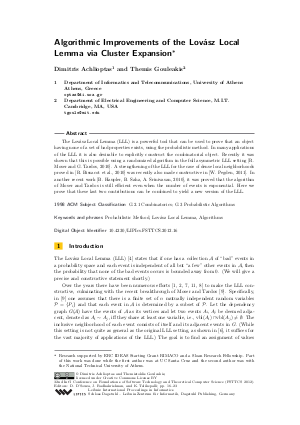Algorithmic Improvements of the Lovász Local Lemma via Cluster Expansion
Authors Dimitris Achlioptas, Themis Gouleakis
-
Part of:
Volume:
IARCS Annual Conference on Foundations of Software Technology and Theoretical Computer Science (FSTTCS 2012)
Part of: Series: Leibniz International Proceedings in Informatics (LIPIcs)
Part of: Conference: IARCS Annual Conference on Foundations of Software Technology and Theoretical Computer Science (FSTTCS) - License:
 Creative Commons Attribution 3.0 Unported license
Creative Commons Attribution 3.0 Unported license
- Publication Date: 2012-12-14
File

PDF
LIPIcs.FSTTCS.2012.16.pdf
- Filesize: 457 kB
- 8 pages
Document Identifiers
Subject Classification
Keywords
- Probabilistic Method
- Lovász Local Lemma
- Algorithms
Metrics
- Access Statistics
-
Total Accesses (updated on a weekly basis)
0PDF Downloads0Metadata Views
Abstract
The Lovasz Local Lemma (LLL) is a powerful tool that can be used to prove that an object having none of a set of bad properties exists, using the probabilistic method. In many applications of the LLL it is also desirable to explicitly construct the combinatorial object. Recently it was shown that this is possible using a randomized algorithm in the full asymmetric LLL setting [R. Moser and G. Tardos, 2010]. A strengthening of the LLL for the case of dense local neighborhoods proved in [R. Bissacot et al., 2010] was recently also made constructive in [W. Pegden, 2011]. In another recent work [B. Haupler, B. Saha, A. Srinivasan, 2010], it was proved that the algorithm of Moser and Tardos is still efficient even when the number of events is exponential. Here we prove that these last two contributions can be combined to yield a new version of the LLL.
Cite As Get BibTex
Dimitris Achlioptas and Themis Gouleakis. Algorithmic Improvements of the Lovász Local Lemma via Cluster Expansion. In IARCS Annual Conference on Foundations of Software Technology and Theoretical Computer Science (FSTTCS 2012). Leibniz International Proceedings in Informatics (LIPIcs), Volume 18, pp. 16-23, Schloss Dagstuhl – Leibniz-Zentrum für Informatik (2012)
https://doi.org/10.4230/LIPIcs.FSTTCS.2012.16
BibTex
@InProceedings{achlioptas_et_al:LIPIcs.FSTTCS.2012.16,
author = {Achlioptas, Dimitris and Gouleakis, Themis},
title = {{Algorithmic Improvements of the Lov\'{a}sz Local Lemma via Cluster Expansion}},
booktitle = {IARCS Annual Conference on Foundations of Software Technology and Theoretical Computer Science (FSTTCS 2012)},
pages = {16--23},
series = {Leibniz International Proceedings in Informatics (LIPIcs)},
ISBN = {978-3-939897-47-7},
ISSN = {1868-8969},
year = {2012},
volume = {18},
editor = {D'Souza, Deepak and Radhakrishnan, Jaikumar and Telikepalli, Kavitha},
publisher = {Schloss Dagstuhl -- Leibniz-Zentrum f{\"u}r Informatik},
address = {Dagstuhl, Germany},
URL = {https://drops.dagstuhl.de/entities/document/10.4230/LIPIcs.FSTTCS.2012.16},
URN = {urn:nbn:de:0030-drops-38440},
doi = {10.4230/LIPIcs.FSTTCS.2012.16},
annote = {Keywords: Probabilistic Method, Lov\'{a}sz Local Lemma, Algorithms}
}
